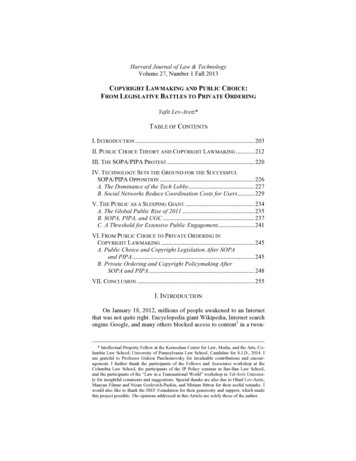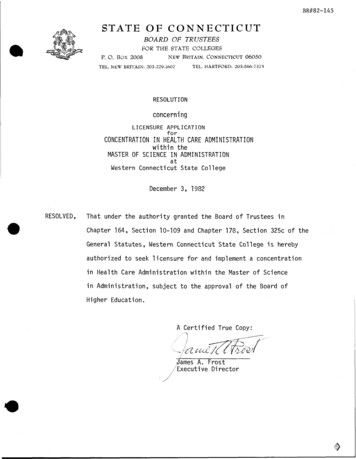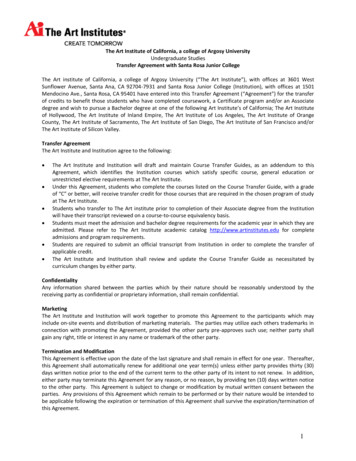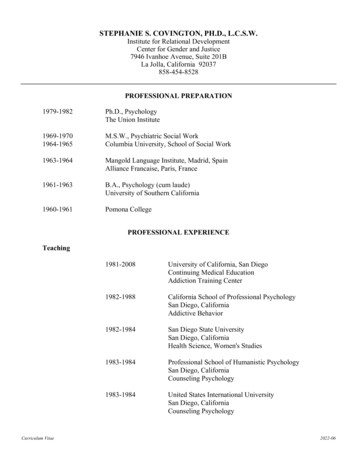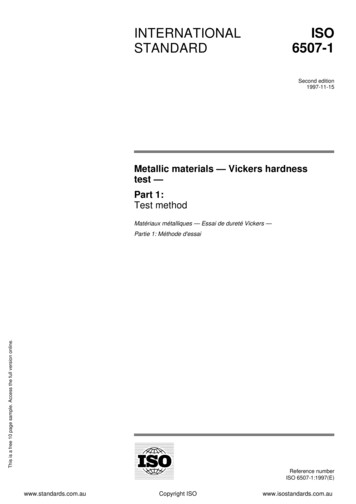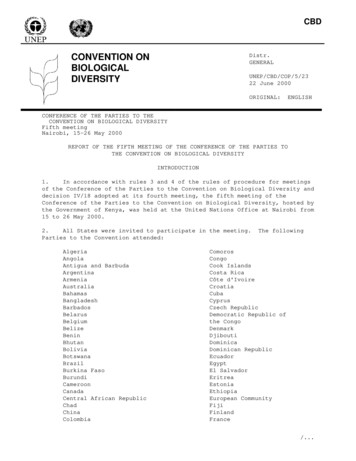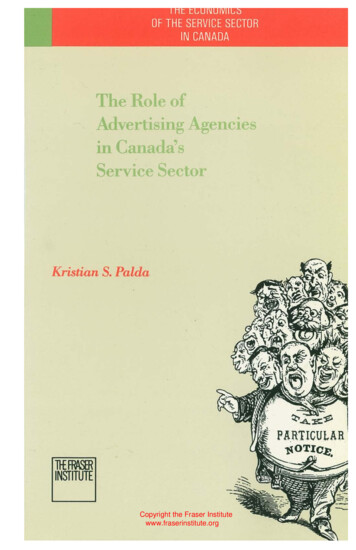
Transcription
Copyright 1982 by International Institute of Islamic ThoughtLibrary of Congress Catalog Card Number: 82-84506Printed by:International Graphics Printing Service4411 4lst StreetBrentwood, Maryland 20722
ISLAMIC THOUGHTAND CULTUREPapers presented to theIslamic Studies Group ofAmerican Academy of ReligionEdited Bylsma'il R. al FariiqiInternational Institute of Islamic Thought1402/1982
ACKNOWLEDGEMENTTo all scholars, members of the American Academy of Religion, whoread papers at the annual meetings of the Islamic Studies Group;To those scholars, especially, who submitted reworked writtenversions of their papers for consideration for publication in this volume;To Br. 'Abd al RaJ:iman bin 'Aqil, Br. Wa'il Shawkat al Khayr'i andDr. Lois Lam ya' al Faruqi without whose material,.academic and moralassistance this publication would not have been possible,The editor's deepest gratitude is acknowledged.
TABLE OF CONTENTSPageIntroduction: The Islamic Studies Group, AmericanAcademy of Religion (1973 - 1981)Jsma"il Riiji al FiiruqiChapter 1:The ShahiidahMuzzammil SiddiqiChapter 2:Isliim and Law'Ala' al Din Kharrufah13Chapter 3:The Pilgrimage to MakkahVictor Danner19Chapter 4:The Shari'ah on Music and MusiciansLois Lamyii' al Ftiruqi27Chapter 5:Ibn Taymiyyah and the Crusades: An InquiryVictor Makkiirl53Chapter 6:On Al Maturidi's Notion of Human ActsJ. Meric Pessagno61Chapter 7:What is "Islamic" in Islamic Literature?Muhammad lfamdun65Chapter 8:The Crusader in the Memoirs of Usamah lbnMunqidhMul:wmmad Khalifah Ahmad73Chapter 9:Islamic Contributions to HistoryMichel Mazzaoui919Chapter 10: The Perfect Man in al Ji/i's ThoughtVictor DannerIOIChapter 11: Dator Formarum: lbn Rushd, Levi BenGerson and Moses Ben Joshua of NarbonneHelen Goldstein107
INTRODUCTIONTHE ISLAMIC STUDIES GROUPAMERICAN ACADEMY OF RELIGIONI.HISTORYFollowing the AAR annual meeting of 1972, Dr. Franklin Littell,then Chairman of the History of Christianity Section and my colleagueat Temple University, Department of Religion, suggested that there is apossibility for setting up a sub-section on Muslim-Christian Encounterunder the aegis of the History of Christianity Section. This sub-sectionwould offer panels and lectures in the annual program. I welcomed thesuggestion and arranged a program for the 1973 annual meeting inChicago. The same invitation was renewed for the 1974 (Washington)meeting. Dr. Littell also advised that we must seek independent statusas a program unit since his chairmanship of the section on the History ofChristianity was to expire soon. At the 1974 meeting a unanimous votewas taken by the scholars present at the Islamics sessions to apply forstatus as an independent program unit. An application was lodged withthe AAR Executive Director for presentation to the AAR ProgramCommittee.The application was turned down, and we participated in the 1975program under the aegis of "History of Christianity." At the 1975meeeting, another unanimous vote was taken and a committee electedto apply for independent status. Again, this was turned down. Althoug we were granted a "Consultation" status, yet our participation appearedin the program under the History of Christianity. At the 1976 meeting, athird unanimous vote was taken and the same committee reelected toapply once more for independent status. This was granted inDecember, 1976, and we began to operate as such. Since then, theIslamic Studies Group participated in five annual meetings. At therequest of the AAR Executive Director, the Group's participation wasextended to cover the 1981 meeting at San Francisco.lri all, we have been responsible for holding9 sessions of I Yi hours each17 sessions of 3 hours each2 plenary sessions of 2Yi hours each.The above-mentioned sessions involved 127 sr··akers and 24 sessions
chairpersons. This is exclusive of the current session, (our tenth) to beheld in New York in December, 1982.We have also held an exhibit of Islamic Art, shown numerous films,and raised 15,000.00 which we plan to spend on publishing threevolumes of papers presented to the AAR under our auspices, to beentitled "Trialogue of the Abrahamic Faiths"; Islamic Thought andCulture" and "Essays in Islamic and Comparative Studies."II.CONSTITUENCYSince we began with no constituency among the members of theAAR, we worked very hard to promote Islamic Studies among them.We advertised the AAR Islamic Studies programs throughout the U.S.and Canada, and we sent out bulk mailings of 1000 or more pieces fortwo years. We solicited papers from our friends and acquaintances.Gradually, the responses came and they were encouraging. At any oneof our meeting, we could count 40 participants, and some sessions wereattended by more than IOO persons. Today, we estimate that "IslamicStudies" is a live entity in the consciousness of at least 200 members ofthe AAR though not all of them attend every session.Ill. METHOD AND PHILOSOPHYMost of the papers presented under Muslim-Christian Encounter orIslamic Studies were by special invitation. We also received a number ofpapers which were unsolicited. In every case, we tried to fit the offeredpapers into the program without jeopardizing the planned themes forsessions. However, the desire of the Steering Committee was to focuseach session around a chosen topic so that speakers and audience couldinteract on a particular issue.As much as possible, we tried to make the Islamic Studies Group amixed one, involving Muslims, Christians, Jews and others as speakersand audience. We sought to sensitize every participant that our businessis scholarly and must meet the most exacting standards of scholarship;but that our discipline deals with the values, attitudes, hopes andaspirations of millions of living humans. We endeavored to make ourmeetings lively by looking into problems of Muslims as a livingcommunity. In our criticisms and suggestions, we sought aphenomenological approach wherever possible. Over the years. ourmeetings have become richer than those of the American OrientalSociety where the approach is basically linguistic and/ or textual, and ofthe Middle East Studies Association where the approach is basicallystrategist. We have succeeded in drawing to the AAR a number of newmembers from both associations as well as a number of Muslimscholars.2
Over the entire period of ten years of activity (nine annual meetings)there was perfect accord between the Steering Committee and theaudience. Members of the audience repeatedly expressed their approvalof, and gratitude for, the programs we had prepared. Their suggestionswere acted upon, and they were happy to return to the AAR meetingyear after year.IV.A NOTE ABOUT THE FUTUREThe Islamic Studies Group has built up a small but growing andvigorous constituency. Though small by comparison to total AARmembership, this constituency is largely made of scholars who teachIslam either in one undergraduate course, or as a smaller part of anundergraduate survey course in the religions of the world. Already, anumber of specialized lslamicists have been pulled toward the AARbecause of our distinctive approach to comparative study. Moreover,the papers so far presented in the field of Islamic Studies have been ofvery high quality, and they are bound to improve in quality andquantity in the future. It is our considered judgment - and hence, ourrecommendation - that the Islamic Studies Group be upgraded to"section" and that it be given a chance to realize this fuller developmentin the coming decade.Normally, a "Group" Program unit would sit for an election ofa newsteering committee every five years, assuming a decision on the part ofthe AAR to continue same. However, the AAR Executive Director hasasked the present Steering Committee to continue for one additionalyear. Elections will therefore be planned for the annual meeting, 1982.Isma'il R. al FaruqiChairmanIslamic Studies GroupAmerican Academy of ReligionTemple University3
ABSTRACT OF PROGRAMSFOR NINE YEARS1973 History of Christianity: Muslim-Christian Encounter"Muslim-Christian Encounter"Two 1Yi-hour sessionsI.R. al FiiruqlFour, namely,l:fasan l;lanafiJaroslav StetkewyczLois Lamya' al FaruqlW.C. Smith1974 (Washington)Status:History of Christianity: Muslim-Christian EncounterTheme:"Muslim-Christian Encounter in the Age of theCrusades"Sessions:Two 1Yi-hour sessionsPresiding:l.R. al FaruqlFive, namely,Speakers:M. Khalifah AlJmadDon M. RandelJaroslav FoldaEdward A. SynanVictor Makkari1975 (Chicago)Status:History of Chri tianity: Muslim-Christian EncounterThemes:"Islam and Modernism"; "Islam, the University and theAAR"Presiding:I.R. al FariiqlSessions:One 3-hour session, one 1Yi-hour sessionSpeakers:Eight, namely,Charles J. AdamsSarni HamarnahJames WaltzAnis Ai}madJohn L. EspositoWillem Bijlefeldl.R. al FiiriiqlRoderick Hindery4
1976 (St. tory of Christianity: Islamic Studies Group"Teaching Islam to Undergraduates"; "Issues in IslamicThought"Two 1Yi-hour sessions and one 3-hour sessionLR. al FariiqiFourteen, namely,William SheppardJane SmithRiffat BurkiJohn EspositoMerlin SwartzSpencer LavanGary de AngelisJ.M. PessagnoHarold KasimowS. KirmaniAnis Al)madM. ZahniserLois Lamya' al FariiqiHarry Partin1977 (San s:AAR Program Unit: Islamic Studies Group"Sufism"; "Faith and Reason in Islam"; "'Teaching ofIslam: Methods and Problems"; "Changing Status ofWomen"Two 3-hour sessions, two 1\Ii-hour sessionsHarold Kasimow, J. Meric Pessagno, Anis Al)mad, JohnL. EspositoTwenty, namely,Richard MartinIsma'il R. al FiiriiqiJ.M. PessagnoFrederic M. DennyS.A. NigosianJoseph Epes Brownl;lamid Algar'Umar Faruq 'AbdullahJohn L. EspositoElizabeth Fernea5Houston SmithAlan LazaroffLois Lamya' al Faruqi'Abdul Qadir Baig'Abidullah GhaziTamar FrankMary J. GoodNajat aniibaryLois BeckMidl}at Abraham
1978 (New Orleans)Status:AAR Program Unit: Islamic Studies GroupTheme:"Islam in North America"; "Interpretation of Scripturein Islam"; "Islam and Political Liberation"; "Worship inIslam"Four 3-hour sessions; one Plenary SessionSessions:Anis Abmad, J. Meric Pessagno, John L. Esposito,Presiding:Harold KasimowTwenty-eight, namely,Speakers:Yvonne I:IaddadGordon NewbyEarl H. WaughLois Lamya' al Fariiqi'Uthman LlewellynRashid 1-jamidJohn SullivanAlford T. WelchJohn L. EspositoMui}ammad I:IamdunJohn A. WilliamsMuzzammil SiddiqiHarold KasimowIsma'il R. al FariiqlFrederic M. DennyAnis Al)madRichard MartinJ.M. Pessagno'A{'.im NanjlJane I. SmithFrank GormanNewell S. BoothAkbar M u ammadFred R. von der MehdenH.M. FederspielIlyas Ba-YunusVictor DannerWadi' l;laddadPlus:Plenary SessionPresiding: l.R. al FariiqiTheme:"World Community of Islam in the West"Speaker:Wallace D. MuQ.ammad, Chief Imam, WorldCommunity of Islam in the West1979 (New York)In cooperation with the Inter-Religious PeaceColloquium (The Muslim-Jewish-Christian Conference)Status:AAR Program Unit: Islamic Studies GroupThemes:"T rialogue of the Abrahamic Faiths"; ··sufism ";"IslamicThought"Sessions:Five 3-hour sessions; one Plenary Session; one LuncheonPresiding:Jane I. Smith; John L. Esposito; Harold Kasimow, J.M.Pessagno, Msgr. Joseph GremillionSpeakers:Twenty-two, namely,Michael WyschogrodVictor DannerKrister StendahlMarilyn WaldmanMul)ammad 'Abd al Raiif Sayyid I:Iusayn Na r6
Seymour SiegelJohn Raineslsma'il R. al FaruqiWilliam HickmanHoward M. FederspielTamar FrankDimitri GutasHerbert MasonPlus:Presiding:Theme:Speaker:Plus:Howard BurkleWilfred C. SmithFrederic M. DennyJ.M. Pessagno'A'.?i'm NiinjlHenry SiegmanJames FinnMal}miid A wanPlenary Sessionlsma'il R. al Faruql"Trialogue of the Abrahamic Faiths"Cardinal Sergio Pignedoli, The VaticanLuncheon in honor of Cardinal Pignedoli1980 (Dallas)Status:AAR Program Unit: Islamic Studies GroupTheme:'The Fourteenth Centennial of lsfam: ContributionsThrough the Centuries to the Moral, Intellectual andBeautiful Life"Sessions:Two 3-hour sessionsPresiding:Frederic M. Denny; Jane I. SmithSpeakers:Thirteen, namely,Yvonne l:laddad'Aliiuddln KharrufahKristina NelsonJafran JonesAnthony WelchKhalidah SalamPlus:J.M. Pessagnolsma'il R. al FariiqiS. I:Iusayn Na rMichel MazzaouiMark WoodwardNoel Q. KingElizabeth FerneaExhibit of Islamic Art comprising:400 mounted pictures of Islamic art works inArchitectureCeramicsPaintingCalligraphyMetal, wood and cloth works300 art objects, comprisingTextilesJewelryLeather, ceramics and metal worksCalligraphic Manuscripts and decorations7
Carpets3 films on lsliimic Art(In cooperation with the Muslim Students' Association of the UnitedStates and Canada and the National Committee for the FourteenthCentennial of Islam)1981 (San Francisco)Status:AAR Program Unit:Themes:"Interaction between"Interaction betweenSessions:Two 3-hour sessionsPresiding:Isma'll R. al Fiiriiql,Speakers:Twelve, nameiy,Islamic Studies GroupIslam and Christianity";Islam and Judaism"Harold KasimowJ.M. PessagnoS. Ijusayn Na rRichard B. RoseVictor DannerA mad 'IsaT. Patrick BurkeHelen GoldsteinWilliam BrinnerLois Lamya' al FiiriiqlNorman StillmanDavid ArielNorbert Samuelson8
THESHAHADAHMuzzammil H. SiddiqiMuslim World League, New YorkWhen discussing the first pillar (rukn) of Islam, scholars usually tendto pay all their attention to the concept of monotheism or taw/:lid.Taw}Jid is, no doubt, a very important principle of 'slam and the mostsupreme value in its religious structure. In this paper, however, wewould like to discuss the notion of Shahadah or"bearing witness"as anelement of faith in Islamic life.A famous l:f adith narrated in this connection by al Bukhari says::r-'ii I rut,,: J .&1 .&1 J,.; JU: JU .&1 ; LJ: I.&1J,.;1 0 tJ .&I 'ii 4.ll 'i 0 1ii.ilf.!.: J r 'il (' 0 'i1 ':"taS c.s; I) « 0 Wi.a; r J, 1J, iilS.;JI .,. 1 ,"Jbn 'Umar said, the Messenger of Allah- peace and blessings ofal/ah be upon him - said, 'Islam is built on jive things, the bearingof witness that there is no God but Allah and that; Mul;wmmad isthe Messenger of Allah, and the keeping up of prayer and thepayment of zakat and the pilgrimage and fasting in Rama f,an. "'(Al Bukhari, Kitab al Iman, I)It is on the basis of this and many other simiar }Jadiths that the firststatement of taw}Jld is known as Kalima! al Shahadah (the statement ofwitness) and thus a Muslim declares:« .&1J,.;1 01 IJ .&1 'i! 4.l[ 'i 0t t "/bear witness that there is no God but Allah and I bear witnessthat Muhammad is the Messenger of Allah."In order to understand the full significance of the word "shahadah"we must turn to the Qur'an, the source and inspiration of all Islamic9
knowledge, where the word "shahadah" occurred in its various formsno less thatn 160 times. Its basic meaning is ''to see with one's own eyes,"or "to be present when something happens or takes place." Thus forexample, in the Qur'an, we read:"So whosoever of you see the month (of Ramacjan) let himfasl."(2:185)."Lei a group of believers see their (adulterers') punishment."(24:2)(V:Ao) « .1 jl u Lo f'-6J »"And the were watching whatever they were doing to !hebelievers. "(85:7)(' rr:r) «.:. ,I.I '7' .:i1 . 1 ,,.:us t"'l »"Were you present when Jacob was visited by death." (2: 133)Shahadah in its further active forms means to attest and to testify whatone has seen. Hence it does not mean only personal knowledge andconviction but also denotes strength of one's conviction in declaringwhat one knows. Thus we read:(( 1, . . . .cl, . , . )'! L.:. .1 .A, \. ,,j ))"And we did not testifl' except what we knew." (22:81)It is because of His supreme knowledge and omniscience that Godis also called Shahid in the Qur'Gn. (see 3:98; 5: 117; 6: 19; 10:46;22: 17; 34:47; 41 :53; 58:6; 85:9 etc.).(\A:T')«-"' Y! o.l! y 1.:al .&I »God al!ests to His own Oneness (3: 18)(' '"\"\: ) (( o.Jy.14-J! J;:.1 .i !a:! .&1 uSl))God attests to whatever He has revealed to His Prophet becauseHe has revealed it with full knowledge (4: 166 ).« J .&IJ.i»God attests that He has sent Mufjammad as His Messenger (6: 19;4:72; 48:28).IO
«I .illt;. .,.iSJ ':1 ,.,J '-"'l:JJ dW.}J »((I .illt;. .,.as, .us: 0;!.l.11J.c II J:-.11 0;!.JJ . .i ll:a .u ,.,) J.} .?.:JI y.))On the Day of Judgement, the Qur'an says, you ears, your eyes, yourhands, your feet and you skin will bear witness against you because ofwhatever wrong or sinful deeds that you have committed deliberatelyand consciously (see 41:20;6: 130; 36:65). One who personifies in himselfwhat he attests and calls others to this testimony is called shahid andshahid in the Qur'cin. Thus the role of the Prophet is that of the shahid.(io:T"r)« IJ:!.'.l:.J l J l.al.!.dW.}l:.J 14:!1 »"O Prophet! verily We have sent thee as a witness, a bringer ofglad tidings and a warner. "(33:45; see also 48:8 and 73: 15).The Prophet is also a shahid i.e. a continuous witness and so arealso the believers charged to be witnesses.J.c . 1.Jf-!.1 ,,S:.J I J ,., 11w 116 J J.i LJ.A I ,.SL-. »(VA: H) « '-"'WI(i\:i)In itsI.2.3.((1 . ':l ;,.J.c4 J»various usages in the Qur an, the Shahadah stands for:Knowledge and convictionCommitmentDeclarationLike Christianity, Islam does not lack detailed creeds. These detailedcreeds were formulated by theolgians aften to combat heresies. Kalima/al Shahadah is, however, the shortest creed of Islam and also thesimplest and the earliest. Wensinck, in vain, tried to prove that duringthe life of the Prophet M u!Jammad this formula of faith did not exist inits present form. According to him, early Muslims only usedi.i l ':I! .U! ')/ and « .illl J,.,J I 11 was added when Muslims laterstarted preaching to Christians and Jews. 1Wensinck's arguments are based primarily upon the assumption thatthe hadith material is unreliable. According to him, hadith at most canbe taken to reflect the time in which is was composed and written andnot the time of M ul)ammad. We shall not discuss this claim in thispaper. Much has already been written to expose the falsity of such· Orientalistic generalization about hadlth. Dr. Mul)ammad Mustafa al'A.J. Wensinck, Muslim Creed. London: Cambridge University Press. 1932. Secondimpression, p. 17-35.11
A'zami gave a thorough refutation of them in his Studies in EarlyJjadlth Literature (Indianapolis: American Trust Publications, 1978).Wensinck, perhaps forgot to consider the call for prayer (adhan) whereboth phrases of shahadah occur side by side in their complete form. Noone, to my knowledge, has questioned the historicity of Adhan whichwas called by Bilal and many other Companions of the Prophet, fivetimes a day in his mosque in Madinah.The two phrases of the shahadah convey fully the basic principles ofIslam. It is, however, signficant that they do not begin with credo or Ibelieve, rather they start with ashhadu (I bear witness) which means notonly that I have faith in God and I believe in Him but also that I see Hispresence before and around me, l am convinced about His uniqueexistence and this is not my private conviction but I want to declare it tothe world. Similarly, I do not only believe in the prophethood ofM ul)ammad but I know him as Prophet and I declare this conviction tothe world.Shahadah is one of the important religious experiences of a Muslim.It begins the day he is born and these words are whispered in both of hisears by father, grandfather or some other pious Muslim. And itcontinued through his growth in Muslim society w'1ere he hears theAdhan five times a day. It becomes his ultimate experience if he has theopportunity to give his life for his faith as a shahid or martyr.12
ISLAM AND LAW'A/ii' al Din KharrufahMuslim World League, New YorkIslam is the chosen religion of God. It is therefore, a complete wayand a comprehensive system of life; and it is so, not in theory alone.Islam is comprehensive in its practicality. By the third century after theHijrah, the Islamic system of law was complete. The shari'ah covered allthe areas usually treated by civil law, criminal law, family law,commercial law, international law, etc. It wil be difficult, if notimpossible, to discuss in detail the contribution of Islam in all thesefields. I shall, therefore, confine myself to the main landmarks of thecontribution of the sharl'ah in these fields.In civil law, Islam made a signficant contribution when itcommanded the Muslims to write down their business agreement and torecord their business transactions. We read in verse 282 of the secondsurah of the Holy Qur'an:"O ye who believe, when you deal with one another, intransactions involving future obligations, in fixed periods of time,reduce them to writing. Let a scribe write down faithfully asbetween the parties."This divine dictate is in the interests of the parties involved. If theyabide by it, they would save themselves from much unnecessary troublethat could arise later between them. However, Islam did not make thislaw rigid but sufficiently flexible, so that in certain cases the merchantsmight be exempted from observing it. The law permitted them toconclude their business transactions by word of mouth or telephonewhere expedient provided that they abide by their words. But it warnedthem of God's greater wrath if they failed or cheated one another. Thus,trustworthiness of the parties played a significant role in business. Islamgave this privilege to the merchants 1400 years ago. A Muslim merchant13
must honor. his commitment made by word of mouth. He mustuphold his pledge at all costs whether he made it in writing or he did itverbally. And no Muslim merchant or businessman may abuse ormisuse this privilege which God has given him. In the event of dispute ordiagreeement between two parties, the sharl'ah, following a l}adfth ofthe Prophet Mul}ammad ( AAS), prescribed that "The burden of proof(evidence) devolves upon the plaintiff."In the field of family law, the contribution of Islam is mostsignificant. No other system of law in the world has done so much toimprove and to elevate the status of women as Islam has done. It gavewoman rights which she did not have before: the right to choose herhusband, to inherit property, and to divorce her husband through acourt. This was truly revolutionary. Before Islam, the condition ofwomen was simply unspeakable: she had no status, no position, and norights. She was treated as something less than a human being, a merechattel, sometimes pleasing but more often a source of anguish. ManyArabs buried female infants alive. for fear of inviting ridicule or socialdisapproval in later life.When Islam announced that a woman was the equal of a man; thatshe was an individual, and had her own personality, her own rights, therest of the world was shocked and surprised. But Islam compelled itsadherents to acknowledge women's rights.Before Islam, one could marry any number of women. But Islam tookthis "privilege" away and restricted the number of women a man couldmarry to four, and that too, under special conditions. Men are notallowed to abuse this privilege. Islam also gave woman the right toinherit and to keep her wealth, and thus to be free from economicdependence upon her husband. She is free to sell her property withoutpermission of her husband - a right which women did not have inEurope until the end of the 19th century. Indeed, Islam gave rights towomen which have been denied in the Western society even today. Itgave her the right to keep her maiden name after marriage. She does nothave to use the name of her husband. This is a right which is still beingsought in many parts of the world. Isfam was thus the first emancipatorof women.In the field of administrative law, Islam gave people the freedom ofexpression and the freedom of assembly within the framework of law. Aman may not abuse these freedoms and tress pass on the rights of others.Islam takes very serious notice of libel, especially against women, andmakes it a serious offence punishable by public flogging. The personfound guilty of libel suffers loss of legal capacity to give witness duringthe rest of his life.Islamic law also introduced the right of "mutual consultation" or14
shura. This was its way of banishing tyranny, whimsey and arbitrarinessfrom Muslim life, whether at home, in business, or in government. Allaffairs, above all the highest affairs of state, are in Islam to be conductedby consultation between all parties concerned. The importance ofconsultation in Islam demanded that a whole surah of the Qur'an bedevoted to it."The believers' affairs are settled in consultation with one another. Forgive the believers, 0 Mu!Jammad, pray for them, andconsult with them on all matters" (Qur'iin 42:38; 3: 159).Moreover, we find our Prophet MuQ.ammad ( AAS) himself seeking toconsult with his companions. "O people, give me your opinion," he usedto say on so many occasions." Islam did not omit to stress theimportance of consulting, not the ignorant, but those who haveknowledge. Allah says:"Consult or ask the people who have knowledge if you do notknow." (Qur'iin 16:43).Al Mawardi took care to elaborate the conditions under which peoplemay give consultation or render advice when asked. They should satisfythree conditions, viz., justice, knowledge and wisdom. Without thesethree qualifications, the person giving consultation is not only devoid ofcredit in the eye of God, but deserves punishment in hellfire.In the field of criminal law, Islam introduced the most importantconcept of "equal compensation." In the Qur'iin Allah (SWT) says:"O ye who believe! The Law of Equality is prescribed for you incases of murder; the free for the free, the slave for the slave; thewoman for the woman. But if any remission is made by thebrother of the slain, then grant any reasonable demand, andcompensate him with handsome gratitude. This is a concessionand a mercy from your Lord. After this whoever exceeds the limitsshall be in grave penalty" (Qur'iin 2: 178)."In the Law of Equality there is (saving of) life to you, 0 ye men ofunderstanding; that ye may restrain yourselves" (Qur'an 2: 179)."No bearer of burden can bear the burden of another" (Qur'an6:164).The first two quotations are called the "Law of Punishment." Islamstands for absolute justice. If a man has been wronged, he must receivewhat is due. And the man who has wronged another person withoutreason must pay for his crime. Justice is a lesson to all members of thecommunity. No one stands above or beyond the law; and no one mayescape the consequences of his crime. The third quotation stresses theprinciple of personal responsibility. Every man will answer for his own15
deeds, and no orie will be held answerable for the deeds of another.Islamic law prescribes capital punishment for voluntarymanslaughter, unless the heirs of the slain forgive the criminal. If thekilling was not voluntary, he criminal must compensate the survivors ofthe slain, or the heirs, according to the traditions and customs of thecountry. The law of capital punishment is based on divine wisdom, andis in the best interests of the society. The alarming crime situation in ourpresent time finds murders becoming ever more frequent and murderersbeing allowed unwarranted leniency. There is a need for Qur'anic lawtoday; it constitutes the only answer to our contemporary problem. It isintolerable that our society must live in constant fear of murderers,robbers and other criminals. The secular penal codes and courts of thepresent day seem to be more concerned for and sympathetic to themurderer than to the victim, his relatives or to society.For the crime of theft, Islamic law prescribes the punishment ofsevering the thief's hand. On the face of it, this looks very severe.However, such punishment is enforced only if the society is notsuffering from deprivation. Where the conditions are abnormal andpeople commit theft due to extreme poverty and suffering, such apunishment will not be enforced on the grounds that the governmenthas failed to provide the basic necessities to its people, and has thereforelost the right to enforce the punishment. The punishment of theft wasonce suspended by Caliph 'Umar ibn al Khanab (RAA) in the year ofgeneral drought and near famine.It is not out of place to mention here the average annual rate of crimesin the United States of America. The frequency of crime is as follows:murderlarcenymotor vehicle theftviolent crimeforcible raperobberyaggravated veryeveryeveryeveryeveryevery27 minutes5 seconds33 seconds31 seconds8 minutes78 seconds5 minutesIO minutesIn international law, Islam gave us a totally new perspective of worldorder. Time permits us but a bare mention of two of its highlights. Firstof these is the duty to maintain peace with every other state or groupwhich has not perpetrated aggression against the Mus Ii ms. Allah(SWT) says in the Qur'an:16
"Allah forbids you not with regard to those who fight you not for(your) Faith nor drive you out ofyour homes,from dealing kindlyand justly with them;for Allah loveth those who are just. "(Qur'an40:8).Second among highlights is that, wherever and whenever it is giventhe choice, the Islamic state must choose peace and not war. In thisconnection Allah (SWT) says:"If your enemy prefers peace, you have to prefer peace, and putyour trust in Allah" (Qur'an 8:60).Third is the obligation of the Islamic state to seek a world orderwherein every other state is Muslim by free choice or a covenanter withthe Isliimic state to co-exist with it in peace. The purpose is to enableeveryone to hear the word of God and to accept ot reject it freely.The fourth is the recognition by Islamic law of non-citizen individualsand groups as legal persons entitled to covenant with the Islamic stateon all matters concerning them. Islamic law grants non-resident noncitizens to take their complaints against citizens as well as the state tot
The Islamic Studies Group has built up a small but growing and vigorous constituency. Though small by comparison to total AAR membership, this constituency is largely made of scholars who teach Islam either in one undergraduate course, or as a smaller part of an undergraduate survey course in the religions of the world. .
